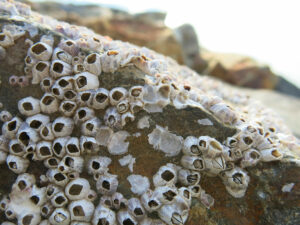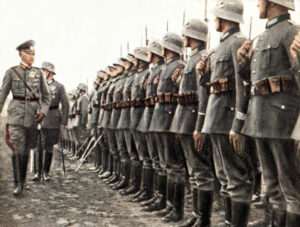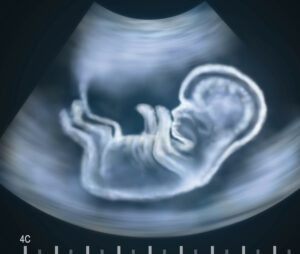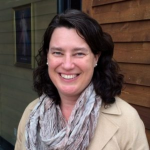
Rock Solid Dignity
June 12, 2024
The first lesson I learned as a little girl about barnacles is that there is no way you can walk on them in bare feet. How could such small, harmless-looking creatures cause so much pain? (Answer for the uninitiated: they shred your feet)! Furthermore, I was fascinated by the contrast between those tiny, very sharp-edged shells on the outside and the squishy creature living inside. Thirdly, was my wonder at how firmly they were fastened to the rocks. Small and powerless as they are, there seemed to be no wave big enough nor human hand capable of separating them once they had cemented themselves to their rock.

We humans are meant to imitate the barnacle by grounding our fragile existence upon a solid rock. The Dicastery for the Doctrine of the Faith’s recent declaration, “Dignitas Infinita”, On Human Dignity, offers two kinds of glue to help us with that grounding when it argues that each and every human person enjoys an inherent, infinite dignity that can never be lost. The first “glue” is based on God’s revelation while the second “fixative” is an appeal to the Universal Declaration of Human Rights, that had its 75th anniversary last December.
It’s my identity that needs grounding and God, our loving Creator reveals to me who I am. God, my Father, wants me to know that I am his beloved daughter, willed and maintained in existence by a specific act of love on His part.
The Second Person of the Trinity raised the dignity of the human person through His Incarnation and then redeeming us by his Passion and Death. My personal worth is now related to Jesus Christ having spent His priceless Sacred Blood on me!
The Holy Spirit works within us, preparing us for the eternal glory to which we are called. My dignity on this count is also inestimable because God wants me to spend eternity enjoying the bliss of loving communion with Him.

If only I could keep present the certainty of who I am, then I would be mindful of my immeasurable worth and dignity along with that of everyone else. But our fallen human nature and personal sins can blind us to this foundational truth about our existence and thus jeopardize the way we treat each other.
In addition to the above, Dignitas Infinita also appeals at various times to the Universal Declaration of Human Rights to emphasize that all people of good will are able to acknowledge the infinite worth of the human person. Both Pope St. John Paul II and Pope Francis have praised this historical document, which was promulgated soon after World War II ended. A common desire was experienced around the world to prevent the possibility of ever repeating the inhuman atrocities committed by the Nazis. Nevertheless, achieving universal consent for the Declaration was no easy feat.

At a certain point, an impasse had been reached because the underwriters had two opposing worldviews and could therefore not agree to the philosophical foundations of the document. On the one hand, was a worldview in line with the natural law that affirms the inherent worth of all human beings by their very existence. A person’s dignity is not determined by any other person or authority. On the other hand, was a worldview, supported by the communist countries, that linked the authority of the state to what could be affirmed about the person. The USSR proposed an amendment to the human rights articles about freedom of speech (article 19) and association (article 20), specifying that fascists and Nazis did not have the right to freedom of expression nor organized alliance. (At the time, their proposal was to exclude the Nazis. However, specifically leaving anyone or any group out, no matter how evil, invalidates the “universality” of the intended Declaration). When this suggestion for omission was not accepted because a handful of countries had voted against including those specific articles (19 and 20), in the end, eight countries chose to just abstain from voting when the Universal Declaration of Human Rights was passed in its entirety (but no one voted against it).
A Catholic philosopher and French representative to UNESCO, Jacques Maritain, was highly influential in bringing about support for the U.N. delegates to sign the Declaration. He helped convince the signatories that they could agree to recognize their common convictions about acknowledging people’s rights even if they couldn’t come to an accord about why. He said afterwards: “We agreed on these rights only on the condition that nobody asks us why.”

This means the Declaration has a susceptible vulnerability to it. Real rights were acknowledged on a worldwide scale, but since the foundational reasons were not included, it would merely take another vote to add “new rights” to the current list, which go against the true dignity of the person, such as the “right” to abortion, the “right” to seek a so-called sex change etc. Thus far, attempts have been unsuccessful to making dangerous addendums of this type.
Jesus Christ concluded his Sermon on the Mount speaking about the importance of building upon a solid foundation, “Everyone who listens to these words of mine and acts on them will be like a wise man who built his house on rock. The rain fell, the floods came, and the winds blew and buffeted the house. But it did not collapse; it had been set solidly on rock” (Mt 7:24-25).

If we wish future generations of people to uphold the infinite dignity of the human person then we need to help them ground their worldview upon the solid rock of Christian anthropology like what Pope St. John Paul II has proposed in his Theology of the Body. My worth cannot rely on the turning tides of opinions nor what governmental agencies are willing to grant in the current culture, but rather it must be built on the solid rock of Divine revelation and the truth of the inherent dignity of the person, something that can be recognized by all people of good will.

Written by,
Dr. Joan Kingsland*,
Fellow & Theological Consultant
for Ruah Woods Institute
*Joan Kingsland SThD, has been a member of the Society of Apostolic Life, the Consecrated Women of Regnum Christi since 1993. She earned licentiate and doctoral degrees in moral theology at the John Paul II Institute for Marriage and the Family in Rome, as well as a Bachelor of Arts degree from Thomas Aquinas College, and a Master of Arts degree from the Pontifical Institute of Medieval Studies at the University of Toronto. She taught moral theology and Catechetics at Mount St. Mary’s Seminary in Cincinnati from 2016-2018, moral theology at Mater Ecclesiae College in Rhode Island from 2006-2015, and Catholic Faith Formation, grades 5-10 at the Highlands School in Dallas, Texas from 2002-2006. During the academic year she resides in Rome and teaches the Social Doctrine of the Catholic Church at Regina Apostolorum Seminary, and in the summer returns to Cincinnati to work in person at Ruah Woods Institute to help in developing curriculum, training, and formation for educators K-12 to become witnesses and passionately understand and teach Theology of the Body to their students.
Share